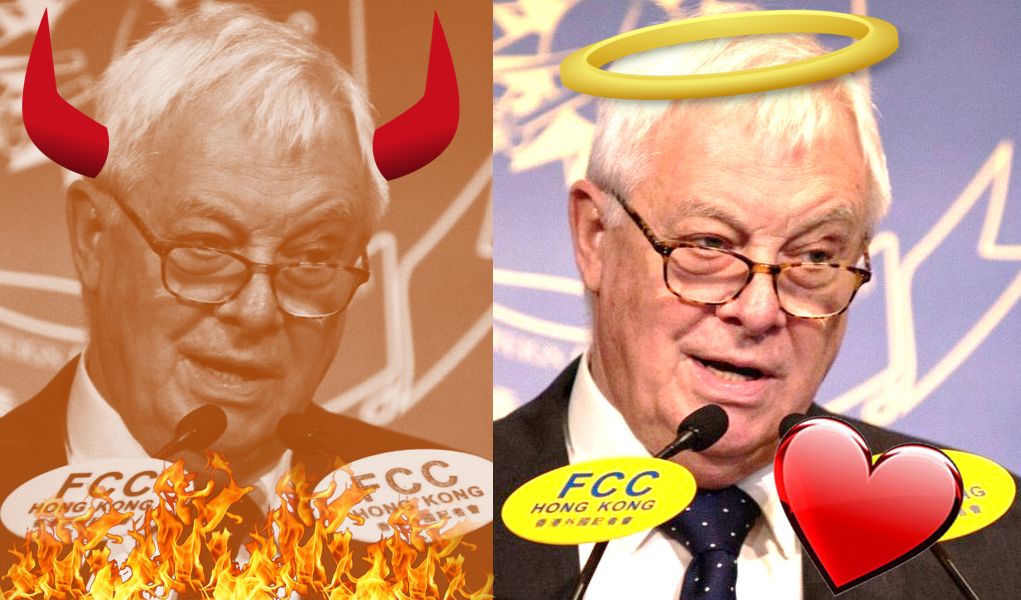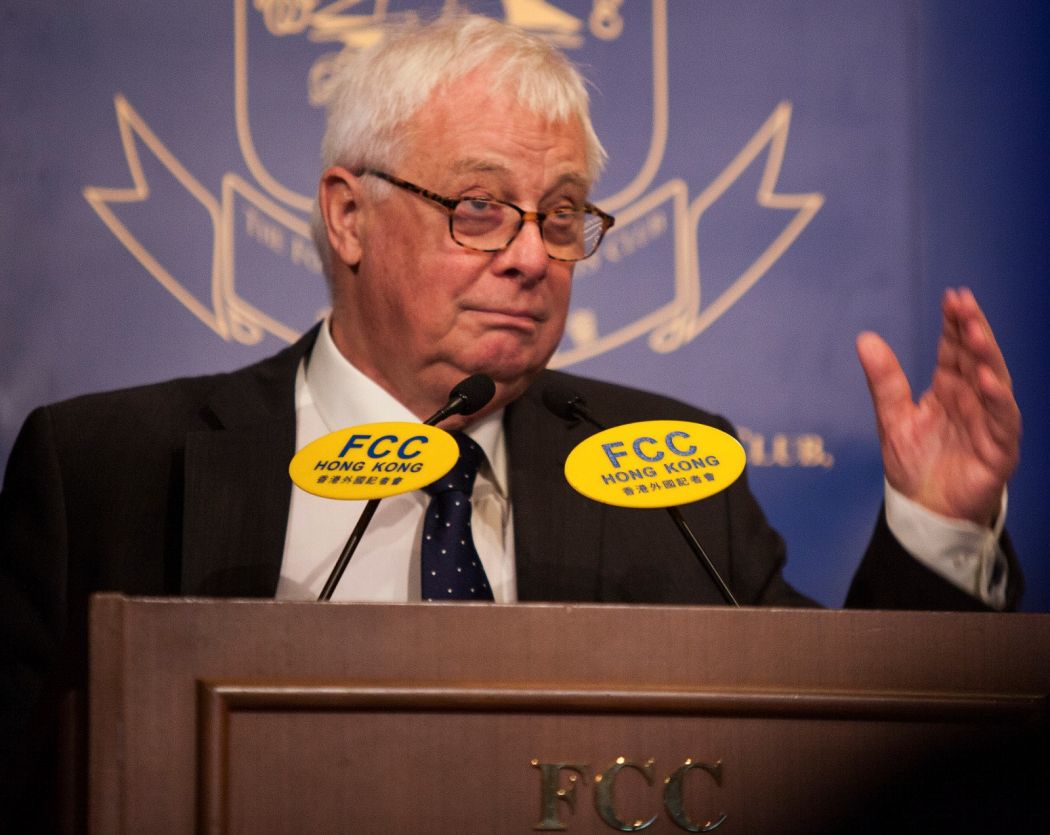What has got into our beloved Lord Patten? He seems to be annoying almost everyone. The pro-Beijing people are angry because he said nice things about democracy. The independence enthusiasts are angry because he did not say nice things about independence. The democracy seekers are not too happy either. Lord Patten’s remark that self-determination is equivalent to independence not only echoes the Beijing camp’s line, an unfortunate coincidence, but also has unhelpful implications for those who merely want an autonomous democratic region.

Saying that self-determination and independence are undistinguishable only makes sense if you believe that given the choice, most people will want independence. But in that case, from the point of view of our imperial masters, democracy is just as bad. Why allow a bunch of malcontents, who really want independence, to rule themselves in minor matters? Some writers have been quite unkind about Lord Patten. Only the purveyors of egg tarts have no complaints.
You have to wonder why he bothers. Other former governors and chief executives keep a low profile. Lord Wilson appears occasionally in his capacity of Chancellor of Aberdeen University at social events for graduates of that august institution. As a result he is the only ex-Governor I have every danced with. Mr Tung Chee-hwa has floated a think tank. But other people do the talking for it. Donald Tsang is … busy.

So there is a Patten problem. Before we explore this let me declare a non-interest. Chris Patten and I attended the same university at the same time and studied the same subject. As far as I know we never met. It was a large university. While he was the Governor of Hong Kong we never met either. We were on a couple of occasions in the same room, for the presentation of the Hong Kong News Awards. It was a very large room. Mr Patten, as he then was, had the refreshing habit of fraternizing with real reporters, rather than following the example of predecessors whose encounters with the media consisted of formal dinners with proprietors and chief editors. But I was not one of the fraternizees, which was OK by me. It is possible, if you are a pure reporter, to have sources who are friends and friends who are sources. If you are writing comments, though, this does not work. Sooner or later you arrive at “how could you write that about me?” We belong in the press box, not the boardroom. Having been quite critical of his predecessors I felt a certain obligation to be quite critical of Mr Patten. But in the big things he did pretty much what I thought was as much as you could hope for under the circumstances.
Those circumstances were that, however much Lord Patten’s affection for Hong Kong or dedication to the interests of its people, his appointment was as the local representative of the British government. And this imposed some limits. In particular the condition of British politics imposed one over-riding constraint on the disposal of Hong Kong. Nobody could say exactly what success would look like. But they knew what failure would look like: several million Hong Kongers turning up at Heathrow carrying passports giving them the right of abode in Britain. This was not because there was any great hostility to Hong Kongers, or to Chinese people, who were unthreateningly dispersed by their penchant for the restaurant business.
But “Asian immigration” had been given a bad name by an influx of Pakistani peasants whose integration presented, and indeed still presents, difficulties. A large increase would sink any government which presided over it. So Britain’s fundamental Hong Kong policy was that, whatever happened, Hong Kong people should stay where they were. Even the modest scheme for giving selected Hong Kongers full UK passports was explicitly and repeatedly justified as being intended to encourage the holders of such passports to stay in Hong Kong, not to move to Britain. Indeed even those idealists who advocated a generous distribution of passports argued that few of the resulting new Brits would be likely to move to the soggy island from which their travel documents came.

This presented a new problem for British colonial policy. All previous colonies had been handed over to their own inhabitants. Last governors took a pride in their adroit reconciliation of local forces to British ideas of democracy and the rule of law. One of the professional last Governors actually called his biography “A start in freedom.” As the years went by it did not go unnoticed that the freshly installed democratic institutions did not always last very long. A certain cynicism crept in, some of which surfaced in parliamentary debates about the future of Hong Kong. Still, there was no precedent for handing five million people over to a Communist dictator.
The answer to this problem was the Joint Declaration, which made rather generous promises about the degree of autonomy and democracy to be enjoyed in post-handover Hong Kong. The two governments involved discovered a shared interest. Britain did not want the population to leave because many of them would have wound up in London. Beijing did not want the population to leave because an empty Hong Kong would have been less valuable than a populated one. So there was a joint effort, not entirely successful, to convince hapless Hong Kongers that the future would be even better than the past, and that the murderous regime from which many of them had fled at great personal cost was now a reformed character. No doubt the negotiators involved on both sides managed to convince themselves, as well as each other, that this was in our best interests.
This was the diplomatic framework within which the last Governor had to work. As an honest man, and a democrat, Patten did his best to make it as difficult as possible for the Chinese government to go back on its word. It was not in his power to make it impossible. In order to like and respect the person he saw in the mirror every morning Patten had to believe that there was a chance, if everyone concerned played their cards right, that Hong Kong people would succeed in plucking the flower democracy from the dungheap of Stalinist despotism. unlikely though that might be. Lord Patten’s continued interest is quite understandable if you see it in this light. If things go one way, he will be seen as a modern Moses who led his children to within sight of the land of milk, honey and autonomy. If things go another way he will be seen as a contemporary version of the death camp guard who announces to the inmates, as they strip for the last time, “leave your clothes here and we will go to the next room for a nice warm shower.”

His Lordship has a stake in our struggle, and this no doubt explains his eagerness to offer unsolicited advice. Goethe wrote that “The noble soul can accomplish all/If it is wise and swift.” Lord Patten no doubt wishes to augment the supplies of wisdom and swiftness. The trouble is he has been away for nearly 20 years. Since he left we have seen the passage of many moons, and a few booksellers. The idea that there is a “democracy debate” with a regime whose local minions want people with inconvenient opinions to be “hunted down like rats” is stretching things a bit. The other day a former radio host was convicted on seven counts of trying to rig the 2015 District Council elections by bribing people to run as bogus localists.
He was offering sums totalling HK$800,000 for this service. Where did that cash come from? Look at it another way. In my constituency we had one candidate disqualified before the poll (petition pending) one disqualified after the oath taking (possible appeal pending) and one now the subject of a government application for disqualification (hearing next week?). All these efforts were made to fix the elections to a hopelessly rigged legislature. Every day we see something more like democracy with mainland characteristics. Hong Kong is pioneering a new sort of democracy: democracy designed by people who wish it to be as undemocratic as possible.
Lord Patten now expresses confidence that Hong Kong will see democracy in 2047. This sort of prediction is dangerous. No doubt he believes this to be true, just as Neville Chamberlain believed in 1938 that he had secured “peace in our time”, President Coolidge believed in 1928 that the prospects for the US economy “have never been better”, and William Pitt believed in 1792 that ”from the situation of Europe we might… expect 15 years of peace.” Political prophesy is not an exact science, especially when an earnest desire for one particular outcome clouds the view. We over-estimate the predictability of history. It does not flow, it lurches, as Taleb puts it.
Lord Patten’s good wishes are sincere and his advice well-intentioned. But Goethe also wrote that “None are more hopelessly enslaved than those who falsely believe they are free.”
